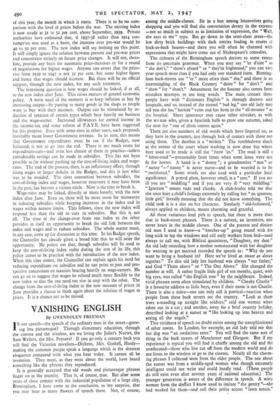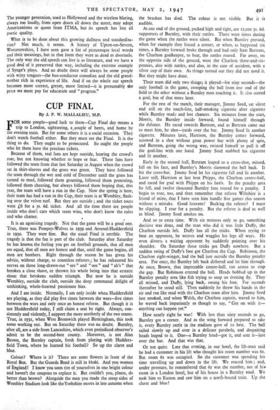VANISHING ENGLISH
By GWENDOLEN FREEMAN IS our speech—the speech of the ordinary man in the street—grow- ing less picturesque? Through elementary education, through the cinema and the wireless, are we losing the Juliet's Nurses, the Sam Wellers, the Mrs. Poysers? If you go only a century back you will find the Victorian novelists—Dickens, Mrs. Gaskell, Hardy— making the common people speak a language which-is the sheerest eloquence compared with what you hear today. It cannot all be invention. They must, as they went about the world, have heard something like the phrases they reproduced.
It is generally accepted that old words and picturesque phrases linger on in the country. That is, of course, true. But after some years of close contact with the industrial population of a large city, Birmingham, I have come to the conclusion, to 'my surprise, that you may hear as many flowers of speech there. Not, of course, among the middle-classes. Sit in a bus among housewives going shopping and you will find the conversation dreary in the extreme —not so much in subject as in limitation of expression, the " Well, she says to me" type. But go down to the semi-slum areas—the low dirty brick buildings with dark entries leading to courts of back-to-back houses—and there you will often be charmed with expressions that might have come out of Shakespeare's comedies.
The richness of the Birmingham speech derives to some extent from its uncertain grammar. When you may say "'er d'aint " or " she don't," " them's afeard " or " they'm frightened," you can vary your speech more than if you had only one standard form. Birming- ham back-streets use "'er " more often than " she," and there is an intermingling of the Black Country " daint " for " don't " and " shaw " for " shan't." Amusement for the listener also comes from mistaken attempts to use long words. The main contact these people have with " dictionary English " is through doctors and hospitals, and so, instead of the eternal " bad leg," one old lady may tell you she has " haricot " veins and has been to the " all-moaner " at the hospital. Sheer ignorance may cause other mistakes, as with the wo nan who, given a hyacinth bulb to grow one autumn, asked the next for " one of them onions again."
There are also numbers of old words which have lingered on, as they have in the country, just through lack of contact with those not using them. The dustbin is a "miskin." The tumbledown shack at the corner of the court where washing is now done but where beer used to be made is still the "brew 'us." The road is still a " horse-road "—presumably from times when some lanes were not fit for horses. A hand is a " donny "; a grandmother " nan " or " nanny "—" nanny" is never nurse—and to be worried is to be " moithered." Some words are also used with a particular local significance. A potted plant, however small, is a " tree." If you are ill you are " middling" and if you are very ill " very middling." " Ignorant " means rude and cheeky. A club-leader told me that she once hurt a child's feelings extremely by calling her " an ignorant little girl," literally meaning that she did not know something. The child took it is a slur on her character. Similarly "old-fashioned," always applied to children, means charming and graceful.
All these variations lend pith to speech, but there is more than that in back-street phrases. There is a naiveté, an invention, one never hears in the middle classes. One of the poorest and dirtiest old men I used to know—a " knocker-up " going round with his long stick to tap the windows and call early workers from bed—used always to call me, with Biblical quaintness, " Daughter, my dear." An old lady recording how a mother remonstrated with her daughter for wanting to get married recorded the speech as: " Why do .you want to bring a husband in? Here we've lived as sweet as doves together." To this old lady her husband was always " our father," and God " Them above " or " The One Above." She changed the number at will. A rather fragile little girl of ten months, quiet, with big eyes, was called "the English rose" by the neighbours. Indeed, vivid phrases seem often stimulated by children. " Cheeky Charlie " is a favourite address to little boys, even if their name is not Charlie. There is also a naive—one can only call it poetical—reaction when people from these back streets see the country. "Look at them trees a-standing up straight like soldiers," said one woman when taken out in a car ; and another, away for a brief country holiday, described looking at a sunset as "like looking up into heaven and seeing all the angels."
This vividness of speech no doubt exists among the unsophisticated of other towns. In London, for example, an old lady told me that her dog was " an owdacious eater." You will find the same sort of thing in the back streets of Manchester and Glasgow. But if my experience is typical you will find it chiefly among the old and the uneducated—those who live cut off from the modern world and do not listen to the wireless or go to the cinema. Nearly all the charm- ing phrases I collected were from the older people. The one about the sunset was from a middle-aged woman who though extremely intelligent could not write and could hardly read. (These people do still exist even after seventy years of national education.) The younger generation is aware of the difference in speech. A witty woman from the district I know used to imitate " the gentry "—she had worked for them—and call their polite accent "lawn tennis." The younger generation, used to Hollywood and the wireless blaring, always too loudly, from open doors all down the street, may adopt Americanisms or quote from ITMA, but its speech has lost all poetic quality.
What is to be done about this growing dullness and standardisa- tion? Not much, it seems. A history of Upton-on-Severn, Worcestershire, I have seen gave a list of picturesque local words and their meanings, but in that form they were as dead as doornails. The only way the old speech can live is as literature, and we have a good deal of it preserved that way, including the extreme example of Syngc's plays. And no doubt there will always be some people with witty tongues—the bus-conductor comedian and the old grand- mother rich in experience of life. And if on the whole our speech becomes more correct, greyer, more limited—it is presumably the price we must pay for educatioh and " progress."



































 Previous page
Previous page